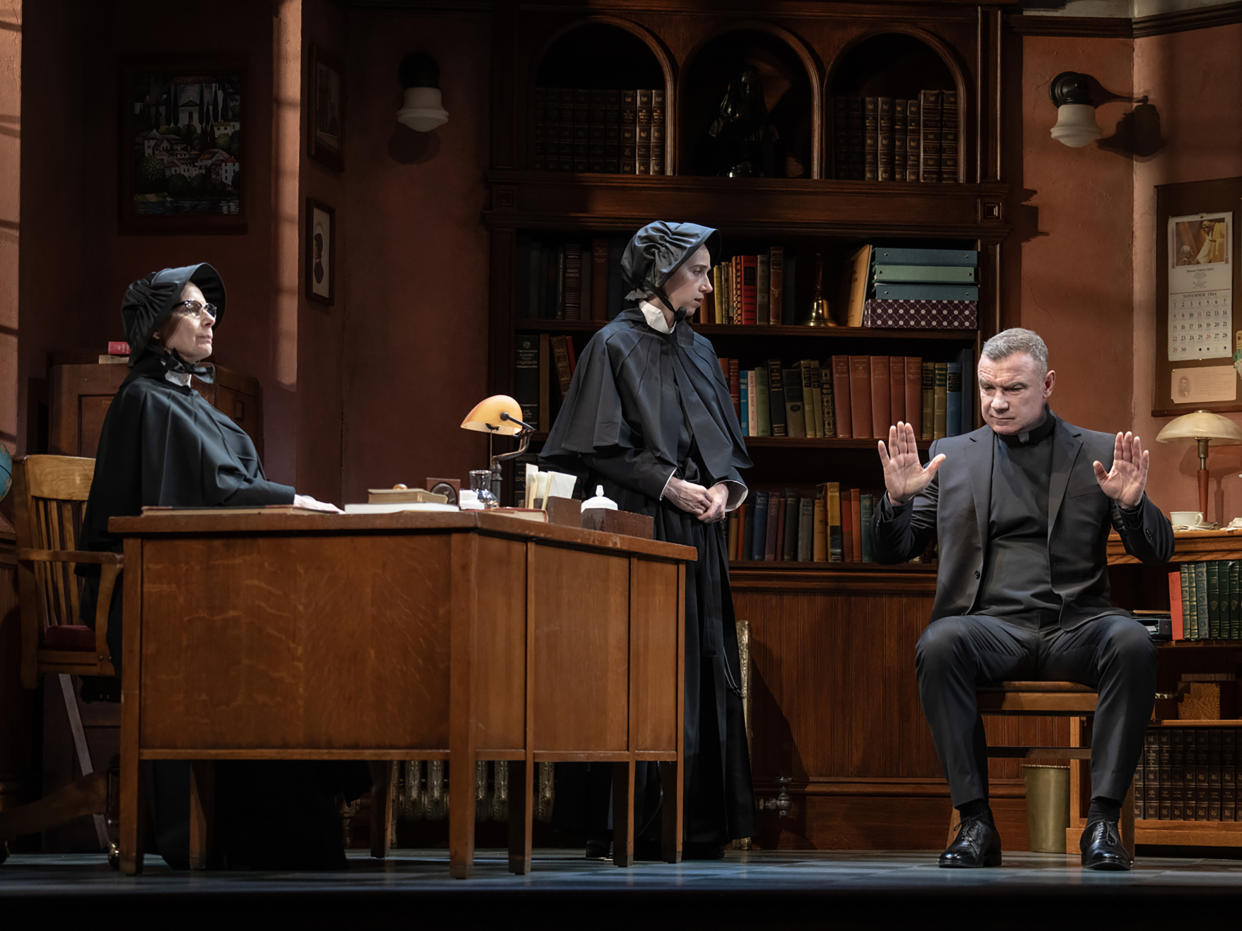Review: ‘Doubt’ returns as a powerful parable on a much-changed Broadway

- Oops!Something went wrong.Please try again later.
NEW YORK — John Patrick Shanley’s “Doubt” was first produced in 2004, near the zenith of the long-lasting crisis over abusive priests hiding in plain sight in the Catholic Church. At the time, it felt like a deeply nuanced play focused on the agony of a whistleblowing nun and, on a broader level, a play about being unsure over a potential accusation that surely will result in grievous harm. Whether the accusation is made or not.
Twenty years later, all reasonable doubt has been removed from “Doubt.”
We’ve learned some depressing things about manipulative humans within powerful institutions since Sister Aloysius Beauvier first sat behind her desk and this taut drama, now back in a gripping new Broadway production from the Roundabout Theatre Company and director Scott Ellis, plays like a cautionary tale, an ode to those women, and some men, who found the courage to stand up against abusers and take the side of the young and vulnerable.
But “Doubt,” now billed as “Doubt: A Parable,” still remains a tense and deeply involving theatrical experience.
I used to think that was because it was deftly structured like a procedural, even like an 85-minute crime thriller. Sister Aloysius (Amy Ryan), the tough-nosed principal of a parochial school, tries to toughen up her scared young sidekick Sister James (Zoe Kazan) to ascertain precisely what Father Brendan Flynn (Liev Schreiber) has been doing with a young student whose breath smelled of communion wine.
But I saw something new and profoundly sad in the play in this revival, thanks in no small part to Ryan’s performance in a role she took over mid-process after the original star, Tyne Daly, left the show. Ryan and Ellis’s focus is not so much on rectitude or certainty but on the character’s fight against her own exhaustion. Ryan, whose performance is tart, vulnerable and unstinting, shows us a character slowly realizing that her unswerving belief in the hierarchy she serves — heck, the way she has ordered her entire life — is incompatible with her moral and practical quest. And the similarly excellent Kazan, whose teaching nun has the assets and drawbacks of youth, can only stare horrified at a future that she now understands is coming for her, too. It’s just a matter of time.
But, frankly, all of that pales when compared to the most devastating scene in the play, which is among the best scenes of any American drama of the last 20 years. It’s a confrontation between Sister Aloysius and the mother of the Black boy under Father Flynn’s potentially nefarious influence. As excruciatingly played here by Quincy Tyler Bernstine, the woman says, in essence, and for God’s sake, leave it alone because the boy’s heap of troubles will collapse into rubble if anything else is piled thereupon.
This particular scene, Shanley’s most masterful, achieves more in 10 minutes or so than most writers manage in entire plays. It simply reveals with alacrity a great truth about how people holding pain learn to compartmentalize, to broker deals to mitigate compounding situations, none of which, of course, should actually be happening at all. In this particular staging, I found it almost unbearable to watch.
I’d argue Schreiber could have chosen an additional note of vulnerability in his performance but his Father Flynn certainly imposes himself, which is what the play demands and, even though the boy is unseen, the actor sure has nailed down the aggressively obsequious kind of intimacy with young people that we’ve now learned came at considerable societal cost.
“Doubt” moves fast, especially here on a relatively simple but highly effective set design from David Rockwell that seems only to add to the play’s inherent sense of dread. You feel a very physical disconnect between community and loneliness, fresh air and hidden secrets, the resolute teacher and the cornered man with petty power. The past being prologue, I left yet more worried for the future than when I came in the door. But here was a play, a timely and now seemingly timeless piece of art that shed light and did what the American theater is supposed to do.
________
"Doubt" is playing through April 21 by Roundabout Theatre Company at the Todd Haimes Theatre, 227 W. 42nd St., New York; www.roundabouttheatre.org
_______
(Chris Jones is a Chicago Tribune critic.)
_______

